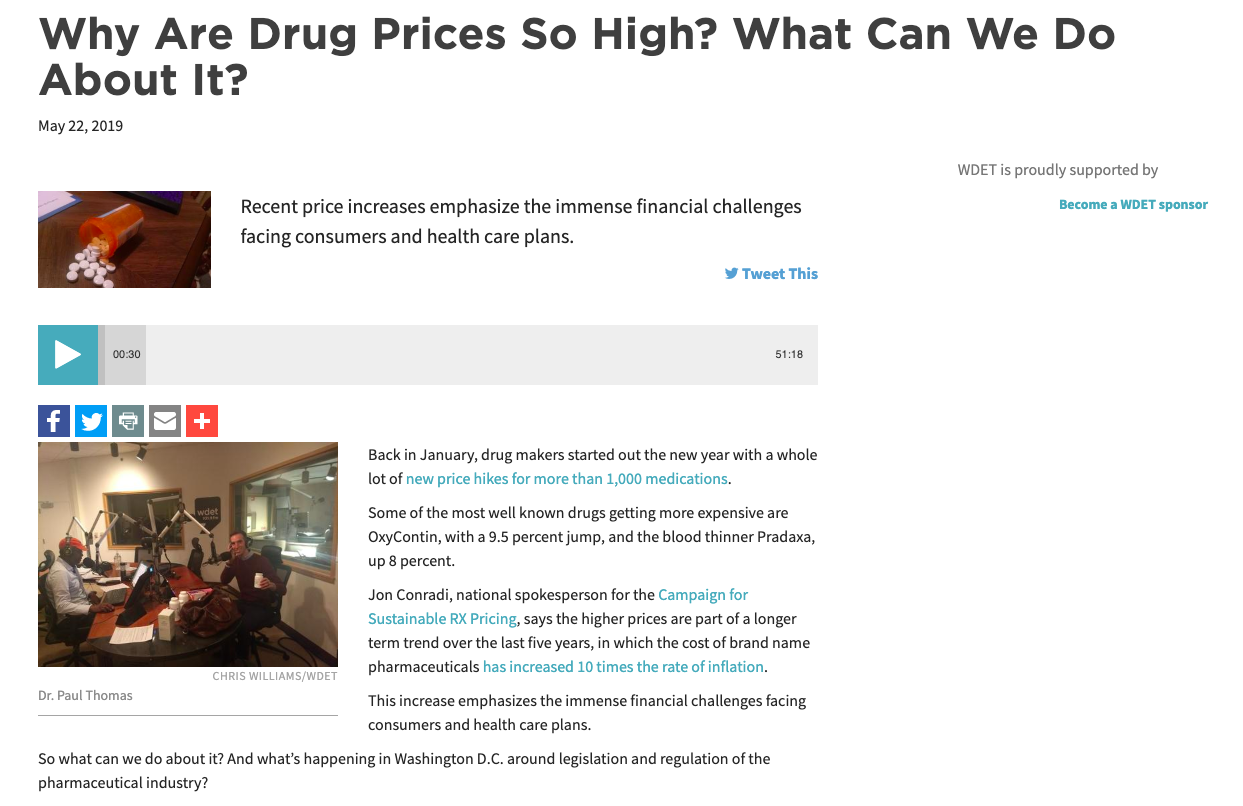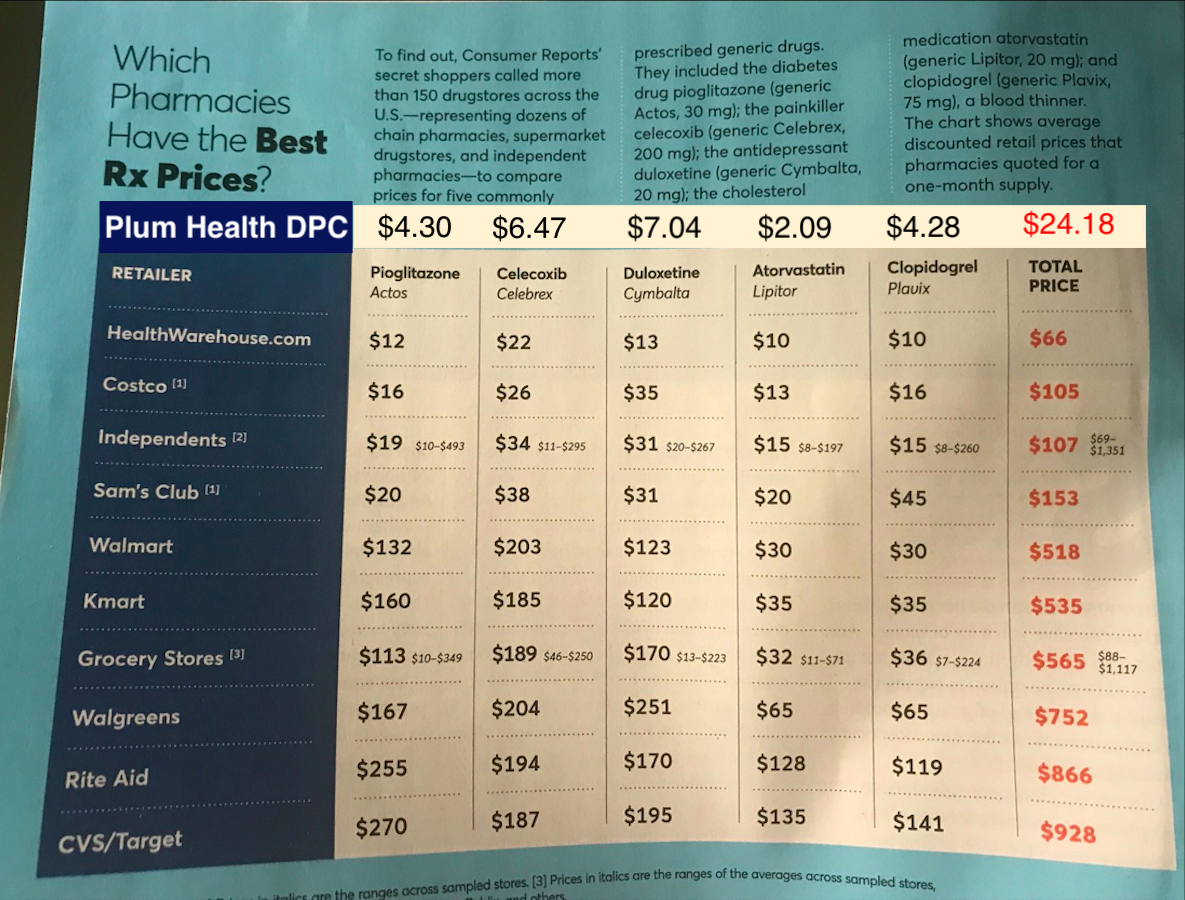Plum Health Blog
Plum Health DPC Lowers the Cost of Prescription Drugs via Channel 7 Action News
Plum Health DPC Lowers the Cost of Prescriptions Drugs in Detroit and Beyond
This evening we were featured on Channel 7 Action news for lowering the cost of medications in Detroit. We started Plum Health DPC in 2016 with a mission: to make health care more affordable and accessible in Detroit and beyond. One part of that broader mission is to lower the cost of medications for our patients.
Paul Thomas MD of Plum Health on Channel 7 Action News
Paul Thomas MD of Plum Health DPC is on Channel 7 Action News with Jennifer Ann Wilson, discussing how we lower the cost of medications in Detroit and beyond.
We buy the most common medications at wholesale and sell them to our patients directly - without a mark up. That’s why our service is called Plum Health DPC, the DPC stands for Direct Primary Care - we deliver primary care services directly to our patients.
By delivering care directly to our patients, we remove the profit takers, pharmacy benefit managers, and retail pharmacies between you and your medications, effectively lowering the cost of those prescriptions by 50% to 90%. Here’s the cost of our seven most commonly used medications:
Metformin 500 mg 1.2 cents/pill or $0.36 for a 1 month supply
Ibuprofen 600 mg 7 cents/pill or $2.10 for a 1 month supply
Lisinopril 10 mg 2.3 cents/pill or $0.66 for a 1 month supply
Amlodipine 5 mg 1.1 cents/pill or $0.33 for a 1 month supply
Sertraline/Zoloft 50 mg 4.8 cents/pill or $1.44 for a 1 month supply
Cetirizine/Zyrtec 10 mg 5.2 cents/pill or $1.52 for a 1 month supply
Loratadine/Claritin 10 mg 3.4 cents/pill or $1.02 for a 1 month supply
We do this work because we know that the cost of medications continues to climb and that people in our community need a fair shake when it comes to getting the medications that they need to stay healthy.
Here’s what Detroit’s Channel 7 Action News (WXYZ Detroit) had to say:
Dr. Paul Thomas started Plum Health Direct Primary Care four years ago in Detroit with a mission.
"We believe that medication should be affordable and accessible," Dr. Thomas said.
His membership-based business model eliminates the pharmacy and prescription benefit managers by getting medications directly from the wholesalers then selling it to his patients at cost.
Here’s the full interview from Channel 7 Action News:
Thanks for reading and watching, and have a wonderful day,
-Dr. Paul Thomas with Plum Health DPC in Detroit, Michigan
Paul Thomas MD of Plum Health DPC on Channel 7 Action News
Dr. Paul Thomas on Channel 7 Action News discusses how Plum Health DPC lowers the cost of medications for patients in Detroit and beyond.
Detroit Doctor Lowers the Cost of Prescription Medications
Medication prices are unsustainably high, putting a huge financial burden on every day Americans. In a recent survey, 8% of adult Americans don’t take their medicines as prescribed because they can’t afford them.
In addition, the cost of insulin for an average patient with Type 1 Diabetes doubled from 2012 to 2016. In fact, the cost of medications like insulin are inflating at higher rates than college tuition, college textbooks, and hospital services.
The cost of insulin is increasing at rates far above overall inflation, even outpacing the cost of college tuition and college textbooks.
All of this data is presented to make the point: health care and specifically prescription medications have become more and more unaffordable for average Americans.
Fortunately, there is a better way to get prescription medications. One way is to develop a relationship with a Direct Primary Care physician, who focuses on improving access to affordable health care services, medications, and lab work.
The medications provided by Direct Primary Care doctors are typically given to patients at-cost or at a small markup to cover shipping, bottles, and labels. Direct Primary Care doctors do this because they believe that health care should be affordable and accessible for everyone.
Our Direct Primary Care practice here in Detroit is called Plum Health DPC and we pride ourselves on lowering the cost of medications for our patients. A partial list of these medications and their prices can be found on our Pricing Page as well as by following this link to our PDF of medication prices.
For example, we had a young lady come in to our clinic with an outbreak of HSV or Herpes Simplex Virus that was affecting her genitals. She went to the local pharmacy and requested a course of Valtrex, and she was told that the medication would cost $100. She heard about our clinic, signed up for our services and now is able to get a course of treatment with Valtrex for $1.49.
As another example, we had a diabetic patient who was not actively managing his diabetes because he was scared about how much the medication might cost. He was not seeking medical attention and was not taking any medication at all for his diabetes. Unfortunately, he developed a severe skin infection that required hospitalization. The nursing staff directed him to our clinic and we were able to get his diabetic medication for free through a pharmaceutical program. Additionally, we are able to manage his high blood pressure and high cholesterol for under $5/month.
Because of this type of work that we do for our patients everyday, we have the privilege of being interviewed on WDET’s Detroit Today. This segment will air at 9:00 am on Wednesday May 22nd. Please tune in or share the podcast link to spread the word about how we’re actively lowering the cost of health care and prescription medications in Detroit and beyond.
Thank you for reading and listening,
Dr. Paul Thomas with Plum Health DPC
For more information on this topic, read our previous blog post, titled: How to Find the Best Prescription Drug Prices in Detroit
Detroit doctor, Paul Thomas MD, is using the Direct Primary Care model to the lower the cost of prescription medications in Detroit and beyond
This is an addendum to the Original Post, from WDET’s post:
Henderson also speaks with Dr. Paul Thomas, a primary care physician at Plum Health in Southwest Detroit. Since 2016, Thomas has had his patients pay an affordable monthly membership fee for healthcare and then he gets them their necessary medication at cost. A common blood pressure medication that would normally cost between $5 and $10 when billed through insurance and filled at a pharmacy, is instead costing patients just 27 cents for a month supply.
How to Find the Best Prescription Drug Prices in Detroit
As many of us are aware, the price of prescription drugs can be astronomical. People are paying for a retail markup at pharmacies, often paying 10 - 20 times as much as the drug actually costs at wholesale. Even worse, insurance companies often charge more for medications purchased via your insurance plan than the medication would cost if you bought it at the cash price.
Why is this important to me? I'm a Family Doctor in Southwest Detroit and I took an oath to do no harm, and for me that oath also includes doing no financial harm. So, I am focused on lowering the cost of health care for my patients and the greater community.
How to find the best prescription drug prices in Detroit
If you're like many people, you probably go to the pharmacy with your Rx card or prescription card from your health insurance company. You then have the pharmacist 'run the card' to find out if you get a discount when you purchase medication.
What you should do instead is ask the pharmacist, "what is your cash price for this medication?" Also, you can ask for any coupons that the pharmacist might have. If you are dissatisfied with the price, then pull out your insurance card and ask for them to 'run the card'. This will ensure that you have a fair price point to start from.
In addition, you can shop around for the best prescription drug prices in Detroit or in your local community by comparing prices online. Using tools like GoodRx.com can help you find the exact price for the medication you need.
Using Direct Primary Care to Lower Drug Prices
There is another option to find even lower prescription drug prices. That option is called Direct Primary Care. In the Direct Primary Care model, doctors aim to provide as much value as possible for patients' health care dollars. In simple terms, we DPC doctors try to lower the cost of health care.
What does this look like? It looks like 70% - 90% savings on prescription drug prices in Detroit and the Metro Detroit Area. Just check out this chart and see for yourself the actual, wholesale cost of the medication compared to the price you would pay at the pharmacy with the retail pharmacy mark up, or the inflated price.
Original image taken from Consumer Reports.
How do we do this? At Plum Health DPC, we buy the medications at a wholesale price and then we sell them to our patients at-cost. This means if we buy a bottle of 1000 blood pressure medications at $10, each pill costs 1 cent. Then your monthly prescription cost for that blood pressure medication is 30 cents.
In the above example, we are able to get Pioglitazone (Actos) for $4.30 per month, Celecoxib (Celebrex) for $6.47 per month, Duloxetine (Cymbalta) for $7.04 per month, Atorvastatin or Lipitor for $2.09 per month, and Clopidogrel or Plavix for $4.28 per month. The total monthly cost would be $24.18 for our patient, and that is a huge cost savings compared to the nearest retail pharmacy.
By lowering the cost of medications, we can improve access to primary care services, better control blood pressure and diabetes, and therefore decrease the risks of heart attacks, strokes, and complications of diabetes in our community. This will lead to lower rates of disability and death, or a healthier society.
We are proud to make a difference in this way. Thank you for reading and learning about the cost of prescription drugs, and let me know if I can help you or a family member lower the cost of health care.
Sincerely,
- Dr. Paul Thomas, MD with Plum Health DPC
Why Generic Drugs Cost So Much
Generic Medications Cost too much money!
There's a wide variability in the cost of generic medications from pharmacy to pharmacy. Researchers at Saint Louis University surveyed 175 pharmacies and asked for their prices for the meds Lisinopril, Carvedilol, and Digoxin. These are common heart failure medications.
The researchers found that the prices for three generic medications ranged from less than $20 to more than $150, with the highest price for all three medications being $397 for a 1 month supply!
This is way too much money. If you spent $150/month on medications alone, it would cost $1800 for the year. In contrast, if you spent less than $20/month on these same medications, it would cost less than $240 for the year. This is a difference of $1,560. Unfortunately, these costs have the greatest adverse effect on low income communities because they may not have the transportation resources to drive to these less expensive pharmacies.
A possible solution is Direct Primary Care. DPC doctors like myself buy medications at wholesale prices and give them to our patients at cost, or with a 10% mark up to cover the cost of shipping and handling. For example, at our clinic Plum Health DPC, we can wholesale these same three medications for about $18/month.
I created this video to more fully explain what I mean, see below.
- Paul Thomas, MD











